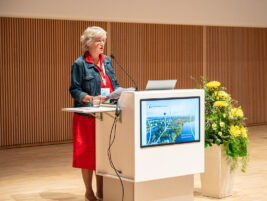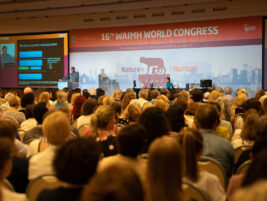This issue of Perspectives is the last one before our Congress in Edinburgh, mainly because so many WAIMH board members and members are busy preparing for it. This is the time for me to thank the WAIMH Office, the Program Committee and the Local Committee for their ongoing, intensive work together, including InConference, managing the myriad of details that make such a big event as a World Congress to become real and successsful. Don’t worry though, the next Issue will come out after the Congress, as a double one!
While working on the development of our Social Media guidelines, and just coming back from a 2 day conference at the International Psychoanalytical University in Berlin (where for the first time a conference on parent-infant psychotherapy was held), I am wondering why we in fact still need large events like a congress. Why were close to 1000 abstracts sent to the Program Committee for the 2014 WAIMH Congress, while many of us (especially the younger ones!) are so used at sharing ideas and experiences quickly with Facebook, LinkedIn, Twitter (and probably other channels I have not heard about). Even at the WAIMH Board, we are getting used to having on-line meetings. Money and traveling time are thus spared…Hence, logically, it may make no sense to go on organizing and participating in large meetings or congresses. Still, to the best of my knowledge, there has not been in the last years a decline in the number of conferences that have taken place all around the world. In fact, the opposite may be true: more and more conferences are held in what was once considered «far-to-reach» places, such as China, Africa, and India.
If so, what need/s do congresses fulfill? One could say “to see places.” This might be true to some extent, but most participants stay in the congress rooms and halls for most of the program. So, there must be something else. I suggest it is the need for real togetherness, where informal , unplanned encounters can take place, associative thinking can lead to new understandings, new plans for joint work discussed. Being physically in the same space has , in my view, a different impact than the electronic togetherness LinkedIn or its like, may have. Indeed, when one leaves his/her own country, he/she leaves some of its daily preoccupations, his/her own society’s standards, stereotypies, ways of thinking, all that is familiar. When we deliberately go to the unfamiliar, it is less anxiety-provoking than when it is imposed on us and it may become a drive for more in-depth exploration. It is then an occasion to learn to see the other, to develop, as Astrid Berg has so well expressed in her memorial words for Mandela, «regard for self and others.» The creation of a “reflective space” has a cognitive and an emotional component in it, just as reflective functioning has in our clinical work. Maybe the possibility of being together and entering into a reflective space where thoughts and feelings can be shared is a strong motivation for each of us to attend a conference or, more specifically, WAIMH’s 2014 World Congress.
Yet, with all this said, don’t worry! WAIMH is getting ready to have a Social Media that will enable those who cannot come to our Edinburgh Congress, to listen at least to the plenary speakers. Indeed, this year’s congress will be our pilot test for the Dicole Social Media company that has been working with WAIMH during these last months becoming to make the organization more accessible during and in-between our biennial congresses. We are currently determining the guidelines for the use of Social Media, keeping in mind our main concerns for confidentiality and reliability.
As Joshua Sparrow has mentioned in his commentary about Thembelihle Dube ‘s fresh and genuine report of her frustrating experiences at trying to make psychological services more responsive, relevant and accessible to the complex needs of a very disadvantaged community in South Africa, creating a reflective space is not an easy task as soon as we go to very disadvantaged populations. Thembelihle Dube has shown how trying to import the Western intervention named as « parenting skills workshop» failed at bringing the parents to attend and reflect on their child’s disruptive behaviors, while the more vague, less psychological, phrase, «let’s build one another,» resonated much better in these parents’ minds and led to a better attendance rate. This leads me to think that reflective spaces may have different foci in various geo-cultural contexts. In our well-nourished, western individual-centered societies, the focus is psychological and very much influenced by the traditional notion of the therapist-patient relationship. In contrast, in other environmental contexts where physical survival is not taken for granted and psychological well-being is not a priority, its focus may be the gathering itself, as a peer group with common adversities, that ultimately leads to moments of reflection.
This interplay between the real and concrete environment and the metaphorical notion of reflective space, may be one more reason to hold our WAIMH Congress in different countries every two years. The environment, very much mediated by the Local Committee, impacts on the nature of the reflective space as it is framed by the Program Committee!
Since our last issue of Perspectives, we have received important feedback from some of you about the draft of the Infant’s Rights Statement. Our next Board on-line meeting on that topic is planned for March 27th, so that we will present a fuller draft for comment and reflection in Edinburgh.
Last, but not least, is the reminder for sending us bids for the 2018 WAIMH Congress. The 2016 one will be held in Tel Aviv.
I personally look forward seeing many of you in Edinburgh,
Warmly,
Miri Keren, WAIMH President
Vol. 22 No. 1 Spring 2014 – President’s Reflections. Congresses, Social Media and Reflective Space
Authors
Keren, Miri,
MD, President of WAIMH,
ofkeren@zahav.net.il,
Israel








